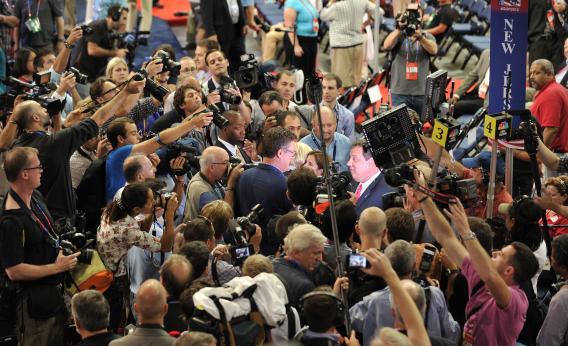Most of the reporting on the 2012 election has been done by men, the Women’s Media Center tells us, in partnership with 4thEstate.net. Among print journalists, the guys are taking the lead by a ratio of 3 to 1. This is a companion analysis to another done recently by the Op-Ed Project, about male domination of opinion writing on topics like politics, economics, and foreign policy. The short story is that men still tend to write more about politics and its kin while women write more about what the Op-Ed Project, usefully or not, calls “pink” topics: The frivolous-sounding ones like fashion, food, and furniture, but also family, health, gender, and education.
Over at the Pacific Standard, Vince Beiser points out that more of the top editors making decisions about who goes on the campaign trail are women, from Jill Abramson at the New York Times to Arianna Huffington at HuffPo. “Could it be that at least part of the numbers disparity is because there are just more men than women who want to be campaign reporters?” he asks. At least part of it? Most definitely, along with the other usual explanations, like mentoring and subtle signals about who is good at what. Campaign coverage is travel heavy and grueling. If you’re the primary parent, which more women still are, you’re less likely to volunteer for it. I say this as someone who gave up her chance to go to both the GOP and Democratic conventions this year for Slate. I’m not the primary parent exactly: My husband and I pretty much share. But he’s an academic, so this is a crazy time of year for him. I thought to myself: Do I really have to go? Politics isn’t my main thing. And I decided, as I did in 2008, that the answer was no—and then when I realized that Slate’s coverage of the conventions will be light on women who are on the scene, I felt predictably bad about it.
None of this, of course, explains why younger women without kids aren’t on the campaign trail. But my guess is that they are—working more often for online publications that 4th Estate and the Women’s Media Center didn’t count. The Op-Ed project analysis found a more even ratio online than in print. If I’m right, though, then the next question is whether those twentysomethings stick with it as they grow older and move up the career ladder. In the meantime, I’m interested in the note the post about the stats ends on: The female print journalists who do cover the campaign write disproportionately about social issues “such as abortion, contraception, and women’s rights.” I like to think of that as a good thing. There’s nothing frivolous or ghetto-ized about those topics. They’re at the center of this election, right where they should be.
ADDENDUM: Here’s a new gender breakdown of the political coverage of nine different newspapers.
